Unit 1 What's the matter? Section A 1a-2d 课件(共64张PPT)+内嵌音频
文档属性
| 名称 | Unit 1 What's the matter? Section A 1a-2d 课件(共64张PPT)+内嵌音频 | 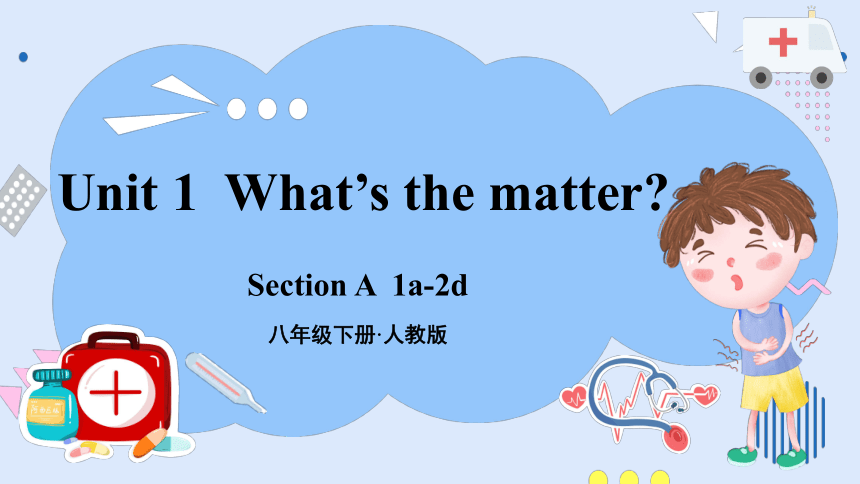 | |
| 格式 | pptx | ||
| 文件大小 | 34.3MB | ||
| 资源类型 | 试卷 | ||
| 版本资源 | 人教新目标(Go for it)版 | ||
| 科目 | 英语 | ||
| 更新时间 | 2022-02-09 18:14:16 | ||
图片预览

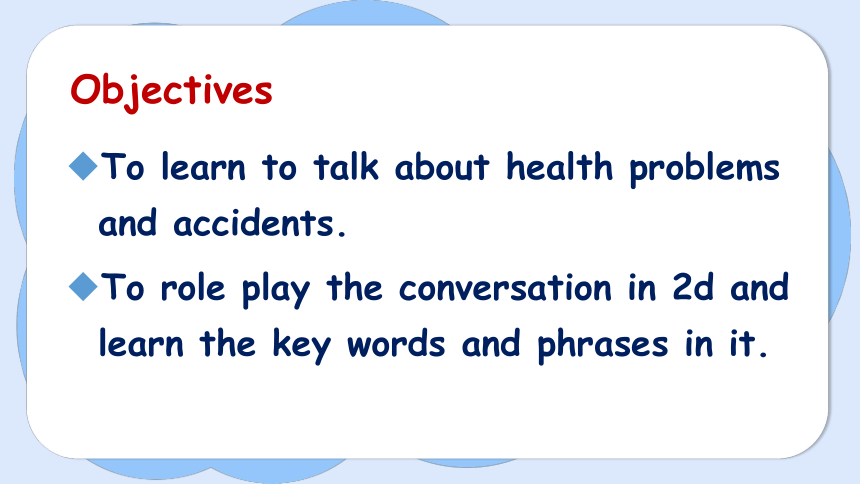
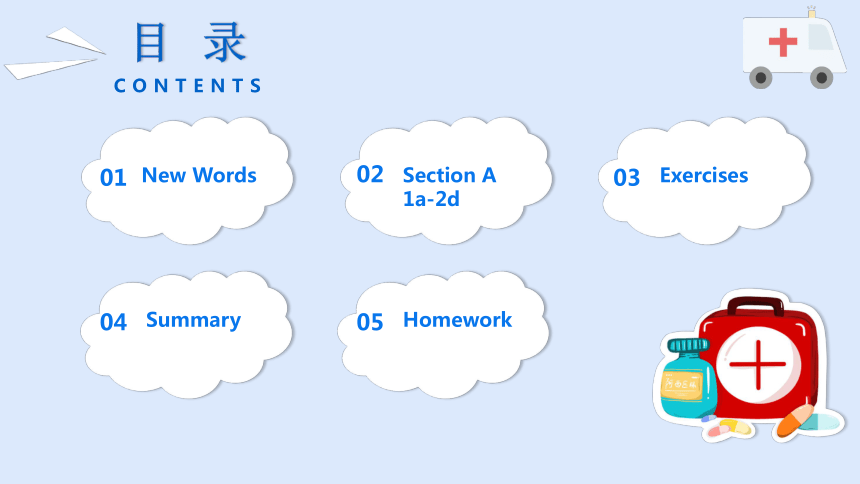
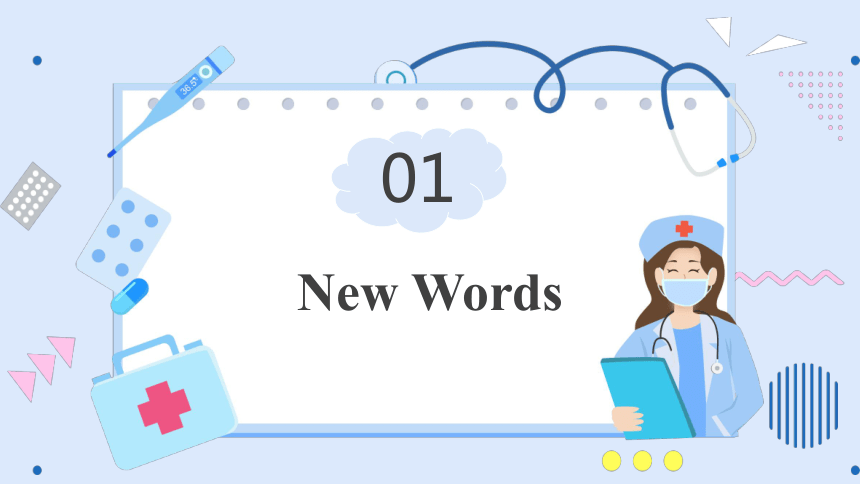
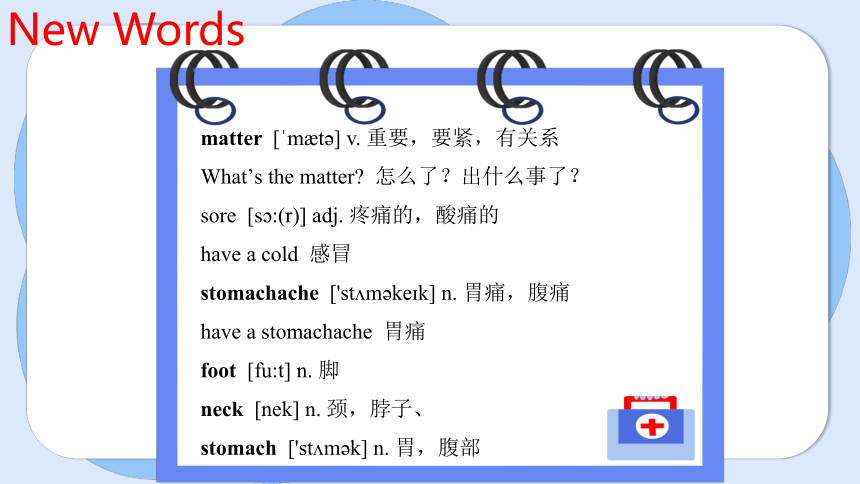
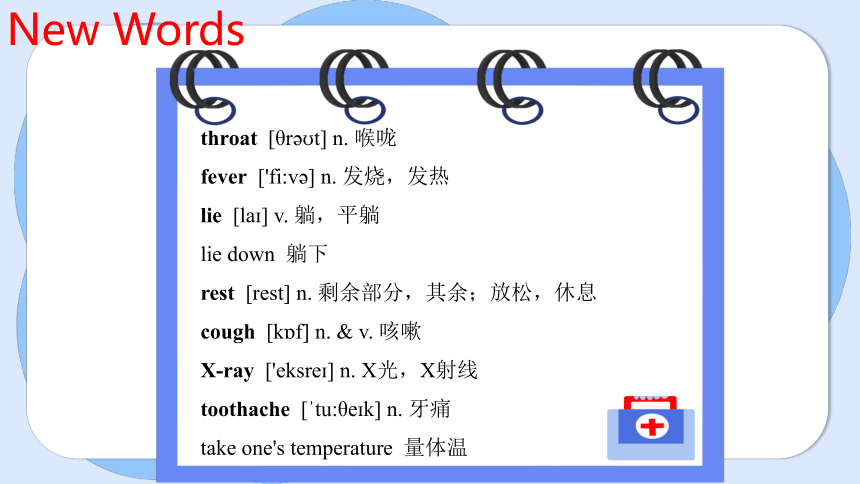
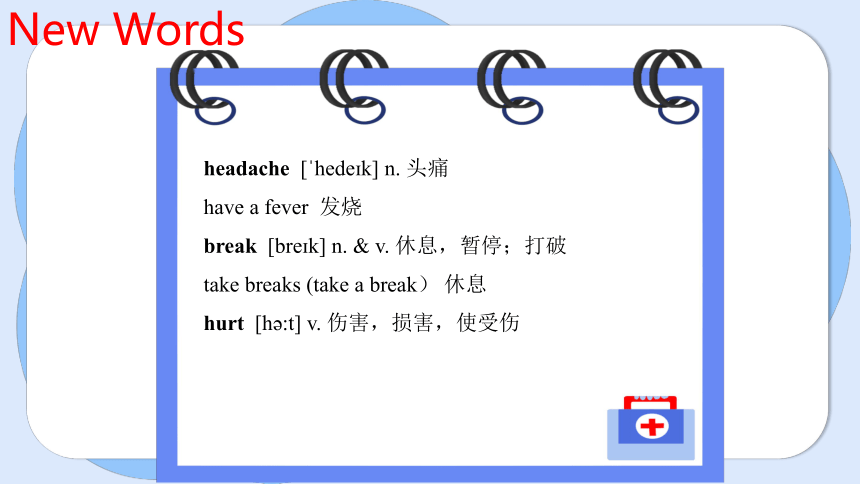
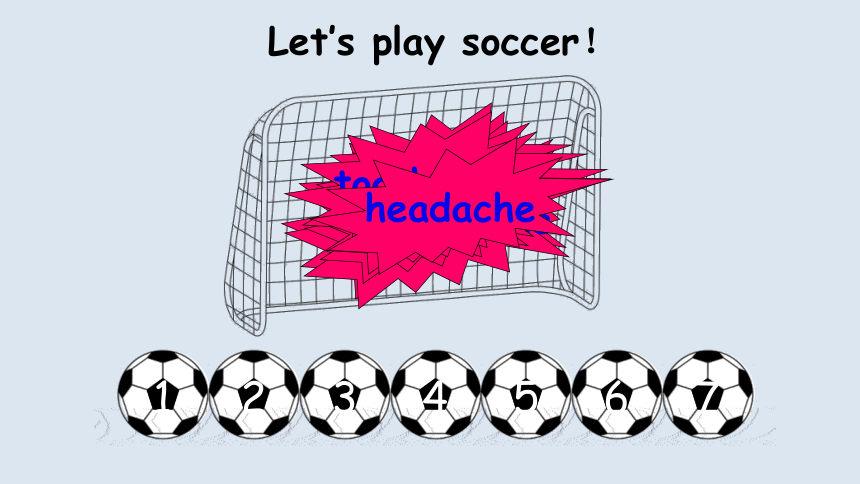
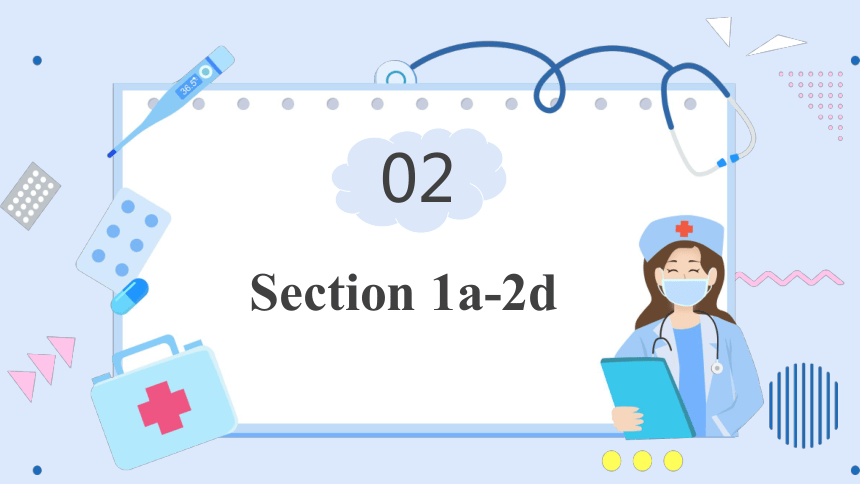

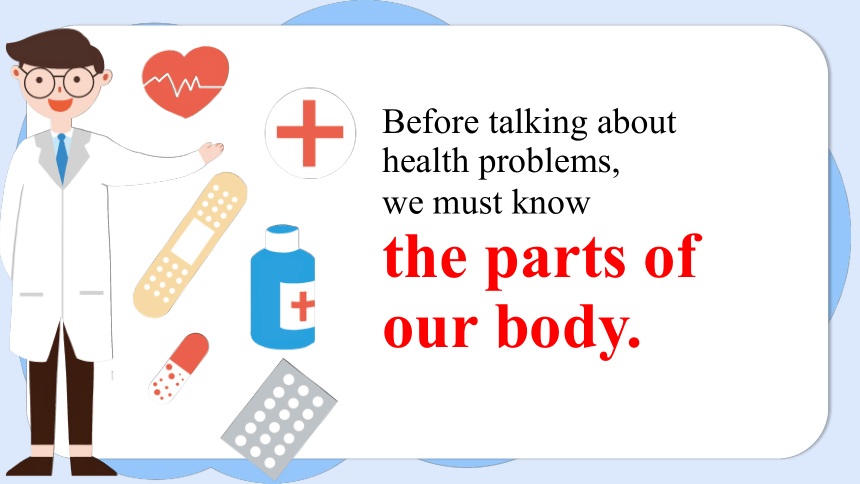
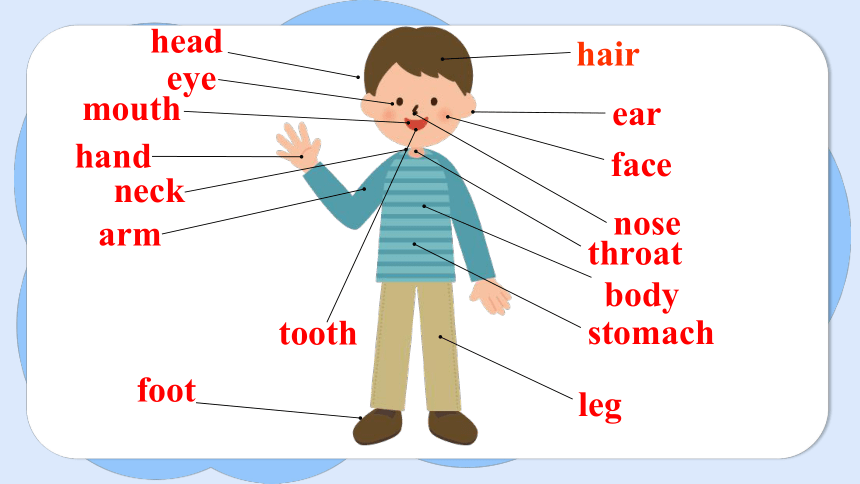
文档简介
(共64张PPT)
Unit 1 What’s the matter
Section A 1a-2d
八年级下册·人教版
Objectives
To learn to talk about health problems and accidents.
To role play the conversation in 2d and learn the key words and phrases in it.
目录
CONTENTS
New Words
01
Summary
04
Section A
1a-2d
02
Homework
05
Exercises
03
New Words
01
New Words
matter [ m t ] v. 重要,要紧,有关系
What’s the matter 怎么了?出什么事了?
sore [s :(r)] adj. 疼痛的,酸痛的
have a cold 感冒
stomachache ['st m ke k] n. 胃痛,腹痛
have a stomachache 胃痛
foot [fu:t] n. 脚
neck [nek] n. 颈,脖子、
stomach ['st m k] n. 胃,腹部
New Words
throat [θr t] n. 喉咙
fever ['fi:v ] n. 发烧,发热
lie [la ] v. 躺,平躺
lie down 躺下
rest [rest] n. 剩余部分,其余;放松,休息
cough [k f] n. & v. 咳嗽
X-ray ['eksre ] n. X光,X射线
toothache [ tu:θe k] n. 牙痛
take one's temperature 量体温
New Words
headache [ hede k] n. 头痛
have a fever 发烧
break [bre k] n. & v. 休息,暂停;打破
take breaks (take a break) 休息
hurt [h :t] v. 伤害,损害,使受伤
have a cold
1
stomachache
2
throat
3
fever
4
cough
5
toothache
6
headache
7
Let’s play soccer!
Section 1a-2d
02
Which is more important,
health or wealth?
Before talking about health problems,
we must know
the parts of our body.
head
eye
mouth
arm
ear
face
hand
foot
hair
nose
body
neck
leg
tooth
stomach
throat
1a
Look at the picture. Write the correct letter [a-m] for each
part of the body.
__ arm __ back __ ear
__ eye __ foot __ hand
__ head __ leg __ mouth
__ neck __nose __ stomach
__ tooth
l
c
d
m
k
f
h
e
g
i
b
a
j
Guessing
What’s the matter with them
have a cough
have a sore back
have a toothache
have a stomachache
have a headache
have a fever
have a cold
have a sore throat
1b
Listen and look at the picture. Then number the names [1-5].
Nancy ____
Sarah ____
David ____
Ben ____
Judy ____
1
2
5
3
4
Listen and fill in the blanks.
Name Problem Reason/Result
Sarah
David
Ben
Nancy
Judy
has a cold
didn’t put on her jacket when it got windy
got a stomachache
ate too much junk food at his friend’s birthday party
has a sore back
hurt himself when playing soccer
has a toothache
didn’t sleep well last night; it hurts a lot
has a very sore throat
talked too much yesterday and didn’t drink enough water
Tapescripts
Conversation 1
Nurse: You don’t look well. What’s the matter, Sarah
Sarah: I was playing with my friends at the park
yesterday. Then it got windy, but I didn’t put
on my jacket. Now I have a cold.
Conversation 2
Nurse: What’s the matter, David Are you OK
David: I ate too much junk food at my friend’s
birthday party. So last night, I got a
stomachache. I almost couldn’t get myself
out of bed this morning.
Conversation 3
Nurse: What’s the matter, Ben Can you move
Ben: Not really. I was playing soccer the other
day and I hurt myself. It seemed OK at
first, but now I have a really sore back.
Conversation 4
Nurse: You look really tired. What’s the matter, Nancy
Nancy: I didn’t sleep very well last night. I have a
toothache. It’s terrible! I can’t really eat
anything either. It hurts a lot.
Conversation 5
Nurse: What’s the matter, Judy
Judy: I’m sorry, but it’s very difficult for me to talk.
Nurse: Oh, dear. What’s the matter
Judy: I talked too much yesterday and didn’t drink
enough water. I have a very sore throat now.
1c
Look at the picture. What are the students’ problems Make conversations.
What’s the matter
with Judy
She talked too much yesterday and didn’t drink enough water. She has a very sore throat now.
Language Points
1. What’s the matter 怎么了?
用于询问某人发生了什么事,意为“怎么了?/ 出什么事了?”。如需引出询问的对象,matter后接介词with即可。
用来询问疾病、不适及突发状况还有如下结构:
1. What’s wrong (with…)
2. What’s the trouble (with…)
3. What happened (to…)
4. Is there anything wrong (with…)
5. Do you have a(n) + 疾病名称
6. Did you catch/get…
7. What’s up
有关疾病、伤害表达法
表示患病:have a(n)+疾病名称
某些搭配中还会使用catch,如catch a cold等。
e.g. have a cold
have a fever
have a cough
have a stomachache
have a toothache
表示身体不适
get + v.-ed形式
be/feel+形容词
be/feel tired be/feel sick
be/feel dizzy(晕头转向)
head feels hot
get hurt
get cut in the hand
get hit by a ball
表示伤害
hurt/cut+反身代词
hurt/cut/break+身体具体部位
hurt my leg cut her finger break his arm
hurt myself cut himself
表达诊治:take/get…(take更常见)
take one’s temperature
take some medicine
take an injection (注射)
take/get an X-ray
表达就医:see…/go to…
see the dentist/doctor
go to a doctor
go to (the) hospital
一般情况下用“ have+a+n.” 表示患了某种疾病。
2. have a sore back 腰痛
患病
在英语中,表达“疼痛或不舒服”时的常用结构:
(1) 主语+have/has+a+病症
have a cold/fever
(2) 主语+have/has+a+sore+发病部位
sore 是一个独立的形容词,指的是身体某一部位的酸痛。如:sore back, sore throat, sore neck.
(3)主语+have/has +a+部位-ache
-ache作后缀,常与表示身体部位的名词合成一个新词,表身体某部位疼痛,如:
tooth(牙齿)+ache=toothache(牙痛)
head(头)+ache=headache(头痛)
back(背)+ache=backache(背痛)
人体部位
+ache
表示身体不适的常用词组:
have a fever 发烧
have a headache 头痛
have a stomachache 肚子痛;胃痛
have a toothache 牙痛
have a bad cold 重感冒
have a sore throat 喉咙痛
have a cough 咳嗽
She doesn’t look well. She ___ a sore throat and a cough.
has
He _______ look well. He _______________.
doesn’t
has a toothache
Look at the pictures and guess what happened.
He looks _______. He ____ a ___________.
gets
Her face looks a bit red. She __________.
terrible
stomachache
has a fever
Her finger (手指) looks ________. She __________ by accident (意外).
terrible
cuts herself
2a
Listen and number the pictures [1-5] in the order you hear them.
2
4
3
1
5
2b
Listen again. Match the problems with the advice.
1. fever
2. stomachache
3. cough and sore throat
4. toothache
5. cut myself
a. lie down and rest
b. drink some hot tea with honey
c. see a dentist and get an X-ray
d. take your temperature
e. put some medicine on it
Conversation 1
Girl 1: You don’t look well. Your face looks a bit red.
Girl 2: Yeah, and my head feels very hot. What
should I do
Girl 1: Maybe you have a fever. You should take
your temperature.
Girl 2: Yes, you’re right.
Tapescripts
Conversation 2
Girl 1: What’s the matter
Girl 2: I didn’t take good care of myself. I didn’t
wear enough warm clothes yesterday. Now
I have a cough and a sore throat.
Girl 1: You should drink some hot tea with honey.
Girl 2: That sounds like a good idea.
Conversation 3
Girl: You look terrible! What’s the matter
Boy: I think I ate too much at dinner last night. It was
an all-you-can-eat meal at the restaurant. But
now I have a stomachache.
Girl: That’s too bad. You shouldn’t eat so much next
time. Right now, you should lie down and rest.
Boy: I guess I should.
Conversation 4
Girl: What’s wrong with your face
Boy: It’s not my face. It’s my tooth. I have a toothache.
Girl: You should see a dentist and get an X-ray.
Boy: But will it hurt
Girl: No, and if you don’t go to the dentist now, it’ll
hurt even more later!
Conversation 5
Girl 1: Oh, no! What happened
Girl 2: I was making dinner just now and I cut myself
by accident.
Girl 1: Oh, that looks serious. You should put some
medicine on it. Here, let me help you.
Girl 2: OK, thanks.
2c
Make conversations using the information in 2a and 2b.
What’s the
matter
My head feels
very hot.
Maybe you
have a fever.
You should take your temperature.
What should I do
2d
Listen and answer the questions.
What’s the matter with Lisa
She has a headache and can’t move her neck.
She played computer games all weekend.
2. What did Lisa do on the weekend
3. What should Lisa do for now
She should lie down and rest.
She should go to a doctor then.
4. What should she do if things don’t get better
2d
Role-play the conversation.
Mandy: Lisa, are you OK
Lisa: I have a headache and I can’t move my neck.
What should I do Should I take my temperature
Mandy: No, it doesn’t sound like you have a fever. What
did you do on the weekend
Lisa: I played computer games all weekend.
量体温
sound like 听起来像
sound +adj.
Mandy: That’s probably why. You need to take breaks
away from the computer.
Lisa: Yeah, I think I sat in the same way for too long
without moving.
Mandy: I think you should lie down and rest. If your head
and neck still hurt tomorrow, then go to a doctor.
Lisa: OK. Thanks, Mandy.
休息一下
Language Points
1.You should lie down and rest.
(1) 躺,位于 lie lay lain lying
I found him lying on the ground.
The village lies in a small forest.
(2) 说谎 lie lied lied lying
He lied to you.
Language Points
2. No, it doesn’t sound like you have a fever.
sound like:听起来像;听上去像
类似表达:
look like 看起来像 feel like 摸起来像
taste like 尝起来像 smell like 闻起来像
典例剖析
Her voice _______sweet. It _______ a bird.
A.sounds;sounds like
B.sounds like; sounds
C.sound;sound like
D.sound like; sound
Exercises
03
What’s the matter
I ____________.
hurt myself
You should
______________________.
put some medicine on it
对症下药
Exercise
What’s the matter
I ________________.
have a toothache
You should
______________________
______.
see a dentist and get an
X-ray
对症下药
Exercise
What’s the matter
I ____________.
have a fever
You should
______________________
________.
drink lots of water and go to bed
对症下药
Exercise
What’s the matter
I _________________.
have a stomachache
You should
_____________________.
lie down and have a rest
对症下药
Exercise
1.昨天夜里我女儿发高烧,所以我立刻带她去了医院。
My daughter __________________ last night, so I took her to hospital right away.
2.——朱迪怎么了?——她现在喉咙很痛。
—What’s _______ _______ _______ Judy
—She _______ _______ very _______ _______ now.
3.我认为你应该躺下休息。
I think you _______ _______ _______ and _______.
4.我应该在上面敷一些药吗?
Should I ________ ________ ________ ________ it
5.他患了重感冒,日夜不停地咳嗽。
He _____ ______ ______ ______ and he ______ _____ _____ ______.
had a high fever
the matter with
has a sore thraot
should lie down rest
put some medicine on
has a bad cold coughs day and night
练一练
Summary
04
重点回顾
1.“What’s the matter with you?”的同义表达
2.表达身体不适的方法
(喉咙痛、发烧、感冒、牙痛、肚子痛、头痛...)
3.lie用法
4.sound与sound like辨析
5.具体建议表达(多喝热水、看医生、上点药...)
Homework
05
Homework
1.Review key words, sentences and language points.
2.Try to think about what you should do when you
or your parents are ill
3. Do the exercises.
THANK YOU !
Unit 1 What’s the matter
Section A 1a-2d
八年级下册·人教版
Objectives
To learn to talk about health problems and accidents.
To role play the conversation in 2d and learn the key words and phrases in it.
目录
CONTENTS
New Words
01
Summary
04
Section A
1a-2d
02
Homework
05
Exercises
03
New Words
01
New Words
matter [ m t ] v. 重要,要紧,有关系
What’s the matter 怎么了?出什么事了?
sore [s :(r)] adj. 疼痛的,酸痛的
have a cold 感冒
stomachache ['st m ke k] n. 胃痛,腹痛
have a stomachache 胃痛
foot [fu:t] n. 脚
neck [nek] n. 颈,脖子、
stomach ['st m k] n. 胃,腹部
New Words
throat [θr t] n. 喉咙
fever ['fi:v ] n. 发烧,发热
lie [la ] v. 躺,平躺
lie down 躺下
rest [rest] n. 剩余部分,其余;放松,休息
cough [k f] n. & v. 咳嗽
X-ray ['eksre ] n. X光,X射线
toothache [ tu:θe k] n. 牙痛
take one's temperature 量体温
New Words
headache [ hede k] n. 头痛
have a fever 发烧
break [bre k] n. & v. 休息,暂停;打破
take breaks (take a break) 休息
hurt [h :t] v. 伤害,损害,使受伤
have a cold
1
stomachache
2
throat
3
fever
4
cough
5
toothache
6
headache
7
Let’s play soccer!
Section 1a-2d
02
Which is more important,
health or wealth?
Before talking about health problems,
we must know
the parts of our body.
head
eye
mouth
arm
ear
face
hand
foot
hair
nose
body
neck
leg
tooth
stomach
throat
1a
Look at the picture. Write the correct letter [a-m] for each
part of the body.
__ arm __ back __ ear
__ eye __ foot __ hand
__ head __ leg __ mouth
__ neck __nose __ stomach
__ tooth
l
c
d
m
k
f
h
e
g
i
b
a
j
Guessing
What’s the matter with them
have a cough
have a sore back
have a toothache
have a stomachache
have a headache
have a fever
have a cold
have a sore throat
1b
Listen and look at the picture. Then number the names [1-5].
Nancy ____
Sarah ____
David ____
Ben ____
Judy ____
1
2
5
3
4
Listen and fill in the blanks.
Name Problem Reason/Result
Sarah
David
Ben
Nancy
Judy
has a cold
didn’t put on her jacket when it got windy
got a stomachache
ate too much junk food at his friend’s birthday party
has a sore back
hurt himself when playing soccer
has a toothache
didn’t sleep well last night; it hurts a lot
has a very sore throat
talked too much yesterday and didn’t drink enough water
Tapescripts
Conversation 1
Nurse: You don’t look well. What’s the matter, Sarah
Sarah: I was playing with my friends at the park
yesterday. Then it got windy, but I didn’t put
on my jacket. Now I have a cold.
Conversation 2
Nurse: What’s the matter, David Are you OK
David: I ate too much junk food at my friend’s
birthday party. So last night, I got a
stomachache. I almost couldn’t get myself
out of bed this morning.
Conversation 3
Nurse: What’s the matter, Ben Can you move
Ben: Not really. I was playing soccer the other
day and I hurt myself. It seemed OK at
first, but now I have a really sore back.
Conversation 4
Nurse: You look really tired. What’s the matter, Nancy
Nancy: I didn’t sleep very well last night. I have a
toothache. It’s terrible! I can’t really eat
anything either. It hurts a lot.
Conversation 5
Nurse: What’s the matter, Judy
Judy: I’m sorry, but it’s very difficult for me to talk.
Nurse: Oh, dear. What’s the matter
Judy: I talked too much yesterday and didn’t drink
enough water. I have a very sore throat now.
1c
Look at the picture. What are the students’ problems Make conversations.
What’s the matter
with Judy
She talked too much yesterday and didn’t drink enough water. She has a very sore throat now.
Language Points
1. What’s the matter 怎么了?
用于询问某人发生了什么事,意为“怎么了?/ 出什么事了?”。如需引出询问的对象,matter后接介词with即可。
用来询问疾病、不适及突发状况还有如下结构:
1. What’s wrong (with…)
2. What’s the trouble (with…)
3. What happened (to…)
4. Is there anything wrong (with…)
5. Do you have a(n) + 疾病名称
6. Did you catch/get…
7. What’s up
有关疾病、伤害表达法
表示患病:have a(n)+疾病名称
某些搭配中还会使用catch,如catch a cold等。
e.g. have a cold
have a fever
have a cough
have a stomachache
have a toothache
表示身体不适
get + v.-ed形式
be/feel+形容词
be/feel tired be/feel sick
be/feel dizzy(晕头转向)
head feels hot
get hurt
get cut in the hand
get hit by a ball
表示伤害
hurt/cut+反身代词
hurt/cut/break+身体具体部位
hurt my leg cut her finger break his arm
hurt myself cut himself
表达诊治:take/get…(take更常见)
take one’s temperature
take some medicine
take an injection (注射)
take/get an X-ray
表达就医:see…/go to…
see the dentist/doctor
go to a doctor
go to (the) hospital
一般情况下用“ have+a+n.” 表示患了某种疾病。
2. have a sore back 腰痛
患病
在英语中,表达“疼痛或不舒服”时的常用结构:
(1) 主语+have/has+a+病症
have a cold/fever
(2) 主语+have/has+a+sore+发病部位
sore 是一个独立的形容词,指的是身体某一部位的酸痛。如:sore back, sore throat, sore neck.
(3)主语+have/has +a+部位-ache
-ache作后缀,常与表示身体部位的名词合成一个新词,表身体某部位疼痛,如:
tooth(牙齿)+ache=toothache(牙痛)
head(头)+ache=headache(头痛)
back(背)+ache=backache(背痛)
人体部位
+ache
表示身体不适的常用词组:
have a fever 发烧
have a headache 头痛
have a stomachache 肚子痛;胃痛
have a toothache 牙痛
have a bad cold 重感冒
have a sore throat 喉咙痛
have a cough 咳嗽
She doesn’t look well. She ___ a sore throat and a cough.
has
He _______ look well. He _______________.
doesn’t
has a toothache
Look at the pictures and guess what happened.
He looks _______. He ____ a ___________.
gets
Her face looks a bit red. She __________.
terrible
stomachache
has a fever
Her finger (手指) looks ________. She __________ by accident (意外).
terrible
cuts herself
2a
Listen and number the pictures [1-5] in the order you hear them.
2
4
3
1
5
2b
Listen again. Match the problems with the advice.
1. fever
2. stomachache
3. cough and sore throat
4. toothache
5. cut myself
a. lie down and rest
b. drink some hot tea with honey
c. see a dentist and get an X-ray
d. take your temperature
e. put some medicine on it
Conversation 1
Girl 1: You don’t look well. Your face looks a bit red.
Girl 2: Yeah, and my head feels very hot. What
should I do
Girl 1: Maybe you have a fever. You should take
your temperature.
Girl 2: Yes, you’re right.
Tapescripts
Conversation 2
Girl 1: What’s the matter
Girl 2: I didn’t take good care of myself. I didn’t
wear enough warm clothes yesterday. Now
I have a cough and a sore throat.
Girl 1: You should drink some hot tea with honey.
Girl 2: That sounds like a good idea.
Conversation 3
Girl: You look terrible! What’s the matter
Boy: I think I ate too much at dinner last night. It was
an all-you-can-eat meal at the restaurant. But
now I have a stomachache.
Girl: That’s too bad. You shouldn’t eat so much next
time. Right now, you should lie down and rest.
Boy: I guess I should.
Conversation 4
Girl: What’s wrong with your face
Boy: It’s not my face. It’s my tooth. I have a toothache.
Girl: You should see a dentist and get an X-ray.
Boy: But will it hurt
Girl: No, and if you don’t go to the dentist now, it’ll
hurt even more later!
Conversation 5
Girl 1: Oh, no! What happened
Girl 2: I was making dinner just now and I cut myself
by accident.
Girl 1: Oh, that looks serious. You should put some
medicine on it. Here, let me help you.
Girl 2: OK, thanks.
2c
Make conversations using the information in 2a and 2b.
What’s the
matter
My head feels
very hot.
Maybe you
have a fever.
You should take your temperature.
What should I do
2d
Listen and answer the questions.
What’s the matter with Lisa
She has a headache and can’t move her neck.
She played computer games all weekend.
2. What did Lisa do on the weekend
3. What should Lisa do for now
She should lie down and rest.
She should go to a doctor then.
4. What should she do if things don’t get better
2d
Role-play the conversation.
Mandy: Lisa, are you OK
Lisa: I have a headache and I can’t move my neck.
What should I do Should I take my temperature
Mandy: No, it doesn’t sound like you have a fever. What
did you do on the weekend
Lisa: I played computer games all weekend.
量体温
sound like 听起来像
sound +adj.
Mandy: That’s probably why. You need to take breaks
away from the computer.
Lisa: Yeah, I think I sat in the same way for too long
without moving.
Mandy: I think you should lie down and rest. If your head
and neck still hurt tomorrow, then go to a doctor.
Lisa: OK. Thanks, Mandy.
休息一下
Language Points
1.You should lie down and rest.
(1) 躺,位于 lie lay lain lying
I found him lying on the ground.
The village lies in a small forest.
(2) 说谎 lie lied lied lying
He lied to you.
Language Points
2. No, it doesn’t sound like you have a fever.
sound like:听起来像;听上去像
类似表达:
look like 看起来像 feel like 摸起来像
taste like 尝起来像 smell like 闻起来像
典例剖析
Her voice _______sweet. It _______ a bird.
A.sounds;sounds like
B.sounds like; sounds
C.sound;sound like
D.sound like; sound
Exercises
03
What’s the matter
I ____________.
hurt myself
You should
______________________.
put some medicine on it
对症下药
Exercise
What’s the matter
I ________________.
have a toothache
You should
______________________
______.
see a dentist and get an
X-ray
对症下药
Exercise
What’s the matter
I ____________.
have a fever
You should
______________________
________.
drink lots of water and go to bed
对症下药
Exercise
What’s the matter
I _________________.
have a stomachache
You should
_____________________.
lie down and have a rest
对症下药
Exercise
1.昨天夜里我女儿发高烧,所以我立刻带她去了医院。
My daughter __________________ last night, so I took her to hospital right away.
2.——朱迪怎么了?——她现在喉咙很痛。
—What’s _______ _______ _______ Judy
—She _______ _______ very _______ _______ now.
3.我认为你应该躺下休息。
I think you _______ _______ _______ and _______.
4.我应该在上面敷一些药吗?
Should I ________ ________ ________ ________ it
5.他患了重感冒,日夜不停地咳嗽。
He _____ ______ ______ ______ and he ______ _____ _____ ______.
had a high fever
the matter with
has a sore thraot
should lie down rest
put some medicine on
has a bad cold coughs day and night
练一练
Summary
04
重点回顾
1.“What’s the matter with you?”的同义表达
2.表达身体不适的方法
(喉咙痛、发烧、感冒、牙痛、肚子痛、头痛...)
3.lie用法
4.sound与sound like辨析
5.具体建议表达(多喝热水、看医生、上点药...)
Homework
05
Homework
1.Review key words, sentences and language points.
2.Try to think about what you should do when you
or your parents are ill
3. Do the exercises.
THANK YOU !
同课章节目录
- Unit 1 What's the matter?
- Section A
- Section B
- Unit 2 I'll help to clean up the city parks.
- Section A
- Section B
- Unit 3 Could you please clean your room?
- Section A
- Section B
- Unit 4 Why don't you talk to your parents?
- Section A
- Section B
- Unit 5 What were you doing when the rainstorm came
- Section A
- Section B
- Review of Units 1-5
- Unit 6 An old man tried to move the mountains.
- Section A
- Section B
- Unit 7 What's the highest mountain in the world?
- Section A
- Section B
- Unit 8 Have you read Treasure Island yet?
- Section A
- Section B
- Unit 9 Have you ever been to a museum?
- Section A
- Section B
- Unit 10 I've had this bike for three years.
- Section A
- Section B
